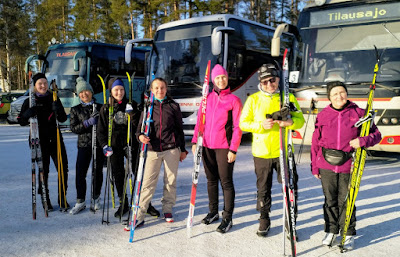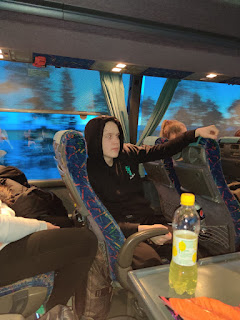We all have many
identities. We don’t relate to many of them until we are put in the spot when
we feel uneasy, confused or helpless. I didn’t mean anything negative even I am
using bad emotion words. On contrary, I believe we grow up from difficulties.
When I was working
with this Erasmus+ exchange project, I unconsciously identified myself as: a learner,
a teacher assistant, a Chinese, an immigrant to Kalajoki, Finland and Europe, a person
who tries to fit into the local community, a person who wants to connect to new
people, a person who couldn’t care less about many others in a big group when
there is a language and culture barrier.
“A learner” is my eternal
identity. In Chinese we say “活到老 学到老 (huó dào lǎo, xué dào lǎo)”.
It can be literally translated into: Live and Learn. Confucius also believes: 三人行,必有我师焉;择其善者而从之,其不善者而改之. The simple
translation would be that you can always learn from the people accompany you. This
identify is far override another identity which is a “teacher assistant”,
especially under the circumstance that I am still “a new immigrant to Kalajoki,
Finland and Europe”.
Secondary schools’ Erasmus+ exchange
project itself creates a unique time and space framework for both students and
teachers to learn cross-culturally inside/from the host’s local community. For
example, “water – a combining element” project brought us to learn about: the industry
port of Kalajoki (Kalajoen Satama), the fishing port of Kalajoki (Kala
Satama), the FinFerries which brought us to Hailuoto (an island that
is ~160km away from Kalajoki), Havula (a residential villa built by the sawmill
owner in 1912). It also connected us with local business and organisations. For
example, the owners of the Adventure Park Pakka gave us a brief
introduction to their business; JEDU’s tourism line provided us very good
meal and fun activities despite of the bad weather; Huskey farmer shared
his knowledge and happiness with dogs with us; we also visited Kalajoki
Marine Nature Center, Bowling hall, Spa and all kinds of
restaurants.
With no doubt, one can always learn
this by oneself these days, if you want or need to. In fact, one probably would
never need to know the Port of Kalajoki even he or she has been living here for
their whole life. In my opinion, that’s exactly where modern education plays
its role: to bring the unknown into someone’s life and make it relevant to that
person.
In the case of Erasmus+ exchange
program, it also lends many pairs of foreign eyes to the hosting ones to look
at or study his or her own local surroundings. It applies to both teachers and
students who are involved in this program. For a person like me, it’s an extra
bonus that I not only dive into the local communities but also learning from
the others from other parts of European Union. It was such a pleasant moment
when the German colleagues came and brought me the greetings from their colleagues,
with whom we travelled to Italy together during this exchange in last May. It
was also a great honor when one of them came to me and humbly started a
conversation with me because he hasn’t had a deep level conversation with a
Chinese before. By continuous conversations, we both get a deeper
understanding of its self-concept and the social and individual differences.
I firmly believe it happens to all the others during this exchange.
In addition to this, it also allows
me to glance into how the other teachers work with their students, take initiatives
and responsibilities in this abnormal setting, compared to their normal
classrooms. We learn from each other and give time and space for each other
to observe, adjust and grow up, which is exactly we, as teachers or teacher
assistants, need to develop in front of the latest curriculum reform.
Nonetheless, there are always many things
we can do better or we hope to do better.
Firstly, I would say, most of
students who take part in the project are coming from a good family background
that one can and willing to host. How to bring the same kind of projects to the
rest of their peer group is something circling over my head.
Secondly, small groups often form “naturally”
inside big groups. How to more effectively promote communication other than reinforcing
the stereotype of each culture is another interesting topic. Have we all tried
all our means to communicate? What are the other ways of communication beyond
languages?
Talking about language, Feb 21 is the
UNESCO International Mother Language Day. I did a small project with International
Studies 1 students. We collected all the mother languages spoken by people in
Lukio and city of Kalajoki and made our own posters. I love to hear when students
saying that they couldn’t believe there are more than 19 different languages
spoken in Kalajoki. And I love to hear when they said “it was fun to do it” after
the lesson. It was fun for me as well. In fact, whenever William encouraged me to teach
Chinese in the lesson, my first reaction would always be: Why bother? Chinese
language is not relevant to them at all. But the Erasmus exchange program helped me to
understand that: Education aims to bring the unknown knowledge into
someone’s life and make it relevant to that person. I think it is also a critical moment for me to truly understand what Mr. Armin Weingartner often mentioned in his Classroom Management lesson:
to offer.


 |
| We believe Kalajoki is a SAFE place to be. |
 |
| We use "Learn, Creative, International and Identity" to describe our "School". |
I hope in the next handful amount of lessons, I could learn more about the internationalisation of Kalajoki with IS1 students. As one of the students said to me via WhatsApp: keep going, and you are doing great work!












